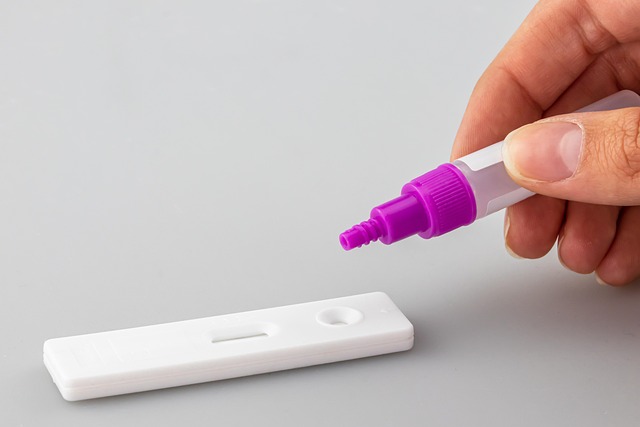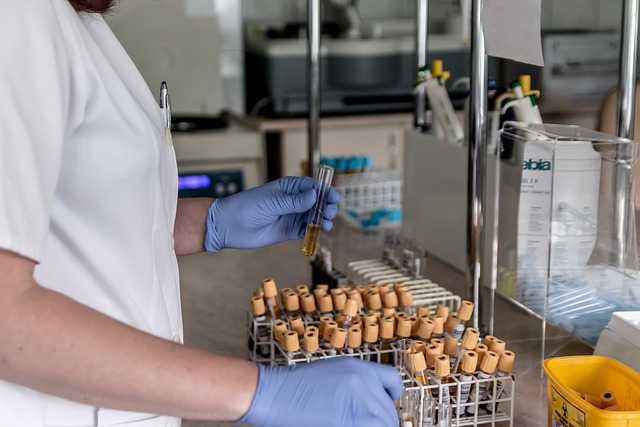High testosterone (hyperandrogenism) impacts health through sexual development, muscle mass, and bone density. Causes range from lifestyle to medical conditions. Balanced diet with zinc, vitamin D, healthy fats, and reduced sugar supports hormone health. At-home tests, guided by healthcare professionals, optimize testosterone level test service. Lifestyle adjustments like exercise, stress management, and dietary choices regulate hormones. Natural remedies, including saw palmetto, nettle root, vitamin D, and adaptogenic herbs, require professional consultation for safe use in managing elevated testosterone levels.
“Unbalance in testosterone levels can lead to a range of health issues. This comprehensive guide delves into natural remedies for high testosterone, offering insights into understanding and managing this hormone.
We explore causes and effects, from diet to lifestyle changes, providing practical tips for balancing hormones. Discover herbal supplements and natural treatments that may help lower excessive testosterone safely. Learn about the importance of a testosterone level test service for accurate diagnosis and informed decision-making.”
- Understanding High Testosterone Levels: Causes and Effects
- Dietary Approaches to Lower Testosterone Naturally
- Lifestyle Changes for Balancing Hormones
- Exploring Herbal Supplements and Natural Treatments
Understanding High Testosterone Levels: Causes and Effects

High testosterone levels, often referred to as hyperandrogenism, can significantly impact an individual’s health and well-being. Understanding the causes and effects is crucial for those considering natural remedies or seeking guidance on testosterone level test services. This hormone plays a vital role in various bodily functions, including sexual development, muscle mass regulation, and bone density maintenance. However, elevated testosterone levels can lead to a range of symptoms, especially when it exceeds the normal range.
There are several factors that can contribute to high testosterone levels, such as lifestyle choices, medical conditions, or hormonal imbalances. For instance, excessive exercise or certain dietary patterns can increase testosterone production. Additionally, conditions like polycystic ovary syndrome (PCOS) in women or testicular tumors in men may cause hyperandrogenism. Recognizing these underlying causes is essential because it determines the appropriate approach to managing and treating elevated testosterone levels. Knowing how often to test T levels and understanding the normal vs. low T levels chart can help individuals make informed decisions regarding their health, ensuring that natural remedies or medical interventions are tailored to their specific needs.
Dietary Approaches to Lower Testosterone Naturally

Maintaining a balanced diet is an effective way to support natural testosterone level test service and overall men’s hormone balance testing. Incorporating certain foods known for their hormone-regulating properties can help optimize t-level optimization strategies. For instance, foods rich in zinc, such as oysters, beef, and pumpkin seeds, are essential for testosterone production. Additionally, vitamin D-rich foods like fatty fish (salmon, tuna), egg yolks, and fortified dairy products have been linked to higher testosterone levels.
On the other hand, some dietary approaches can help lower excessive testosterone. Foods high in healthy fats, like avocados and nuts, promote hormone balance. Reducing sugar intake is also crucial, as high sugar levels can lead to insulin resistance, which disrupts hormone regulation. Some at-home hormone tests reviewed by healthcare professionals can guide men in understanding their hormone levels and making informed dietary choices for t-level optimization.
Lifestyle Changes for Balancing Hormones

Maintaining healthy hormone levels, including balancing testosterone, often starts with lifestyle adjustments. For individuals dealing with elevated testosterone levels, making certain changes can help restore equilibrium. Engaging in regular physical activity is key; aerobic exercises and strength training have been shown to lower excess testosterone. A balanced diet, rich in fruits, vegetables, whole grains, and lean proteins, supports hormonal health while reducing inflammation. Additionally, managing stress through practices like meditation or yoga can positively impact hormone regulation, as chronic stress is linked to increased testosterone.
It’s important to note that if you suspect a testosterone deficiency, consulting a healthcare professional is crucial. They can offer guidance tailored to your needs, which may include recommending specific tests like the T-strip vs blood test comparison for accurate diagnosis. While taking a testosterone sample might evoke concerns about pain, these procedures are typically non-invasive and not painful, ensuring comfort during evaluation.
Exploring Herbal Supplements and Natural Treatments

Many individuals seek natural alternatives to managing high testosterone levels, often as a result of concerns related to health and well-being. Exploring herbal supplements and natural treatments can be an attractive option for those looking to avoid traditional medical interventions like testosterone replacement therapy (TRT) or surgery. Before considering any approach, it’s crucial to consult with a healthcare professional to understand the underlying causes of elevated testosterone and receive guidance tailored to individual needs.
Herbal supplements, such as saw palmetto and nettle root, have been studied for their potential to help regulate testosterone levels naturally. These plants contain compounds that may inhibit certain enzymes involved in testosterone production. Additionally, lifestyle changes like regular exercise, a balanced diet, and stress management can significantly impact hormone levels. Some natural remedies for low testosterone, which may be relevant for those with high levels as well, include vitamin D supplementation, zinc-rich foods, and certain adaptogenic herbs known for their ability to support hormonal balance.
High testosterone levels can significantly impact overall health, but natural remedies offer a promising path to balance. By understanding the causes and effects, adopting dietary changes, implementing lifestyle shifts, and exploring herbal supplements, individuals can effectively manage their hormone levels. Remember, consulting with healthcare professionals is crucial before starting any treatment, including a simple testosterone level test service, to ensure personalized guidance and safe, sustainable results.
